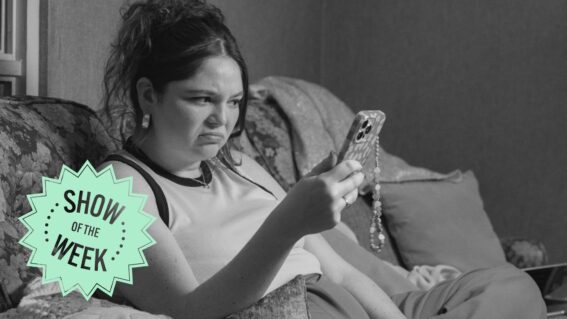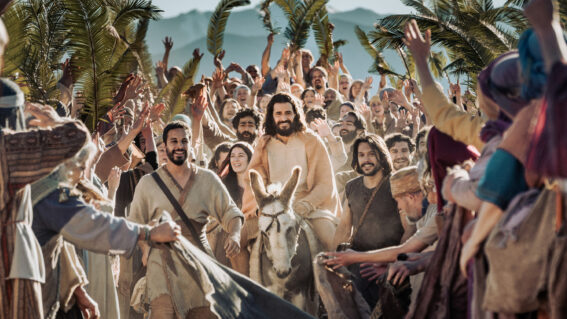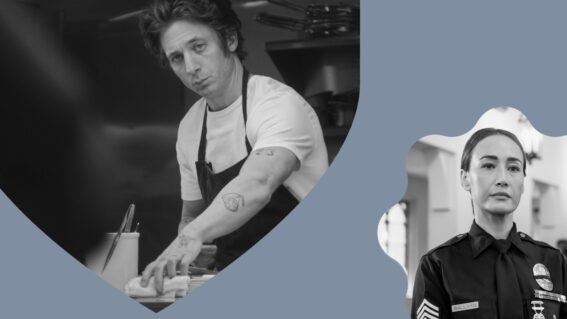Interview: Anchorman 2 director Adam McKay
Director Adam McKay has enjoyed a fruitful comedic partnership with Will Ferrell over the years that dates back to their time at Saturday Night Live. This year, after nearly a decade of working on other stuff together, the pair have revisited the character of Ron Burgundy and the world of Anchorman: The Legend of Ron […]
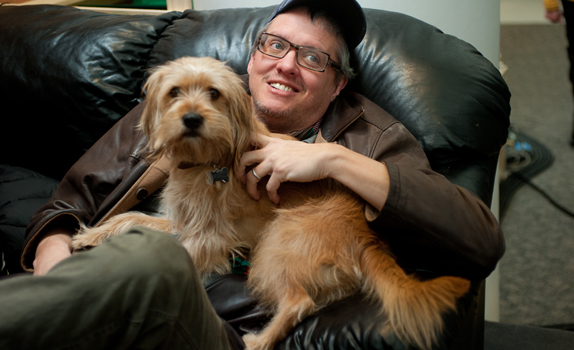
Director Adam McKay has enjoyed a fruitful comedic partnership with Will Ferrell over the years that dates back to their time at Saturday Night Live. This year, after nearly a decade of working on other stuff together, the pair have revisited the character of Ron Burgundy and the world of Anchorman: The Legend of Ron Burgundy in – wait for it – Anchorman 2: The Legend Continues (hey, check out our review of the film). We spoke to McKay recently when he was in Australia to promote the picture, and he was a nice dude – read on!
Are you enjoying your trip down to Aussie?
ADAM MCKAY: Very beautiful. We did a little tour of the harbour yesterday and jumped in the water. It was gorgeous.
Excellent. And you’ve brought a film down that a bunch of us have been waiting to see for quite a while. Before you even knew you were gonna make it, I guess.
It’s true. These were the fans that were asking for it, first and foremost. I remember when Ferrell came back from the Talladega Nights junket they were talking about Anchorman 2.
You obviously created a pretty amazing picture the first time round. It’s been a long time. I’m sure everyone asks why the wait, but… why the wait?
Well for the first five or six years we were really just excited to make a bunch of different movies so we weren’t really looking to do a sequel. But like I said, because of the persistence of people saying, “Where’s Anchorman 2, where’s Anchorman 2?” We finally said “Huh. Well, how ’bout that. Could we make a sequel?” Then we had to get our budget in line, we had to figure it out with the studio. After a few false starts we finally came up with the right number. Between all those left turns and right turns it took about eight years.
I guess it’s difficult for a studio to quantify exactly how much people love a picture and how that translates into a budget, right?
Well the nice thing was that, yes that can be tricky, but once they announced that they were making the movie the response that they got, they had never seen anything like it before. So they’ve been hit with Twitter and calls and letters and you know, internet presence was just overwhelming. It was the best possible thing and the studio got very excited. And from then on it’s been nothing but smooth sailing with them, they’ve been nothing but supportive and been great partners on the whole movie. Mainly because of that huge fan response.
So what I’m taking from this is next time I want something, the best thing I can do is make a whole lot of noise about it online.
The only trick is you’ve gotta get a hundred million other people to do it as well.
Ah shit. OK.
Yeah that’s the tricky part. You can figure it out.

Watching the film today I was thinking that maybe the amount of time that has passed has worked to your advantage in that you didn’t have to do a traditional sequel, you could just come up with whatever you wanted to do.
It’s true yeah, the amount of time allowed us to jump forward a little bit. We didn’t have to pick it up as close to the first one. The only other problem with that jump forward is we had to do a prologue to this movie when the opening credit hits. You’re sort of setting the table. It was a good and a bad thing. The good thing was that yeah, we were free to go where we wanted which was pretty important to the story telling.
Absolutely. There’s so many different ways you could have approached this film. To take a line where there’s a very slim narrative and you’re going to ramp up the insanity factor even more than the first one. It’s always been crazy and massively larger than life. Did you make a conscious decision to get stupider with some of this stuff?
At least within the themes we tried… to not even be stupid, but to just make ourselves laugh, you know and sometimes it happens to be stupid sometimes, it’s absurd sometimes, whatever it is . This one actually has way more of a story than the first one because it’s 24-hour news, it’s the bet with the guys, it’s the relationship with the wife, it’s the new love affair. You know, Brick also has a new love. So there’s actually a bunch of storylines going through this one. The first one was remarkably simple. The first one was really just, woman shows up, freaks him out, Burgundy falls in love with her, she gets an opportunity, he freaks out, gets over it and gets back together with her. That was really it. This one had a lot more spinning plates to it, which was tricky, it was difficult to do but ultimately it was fun going for that epic feel to this movie.
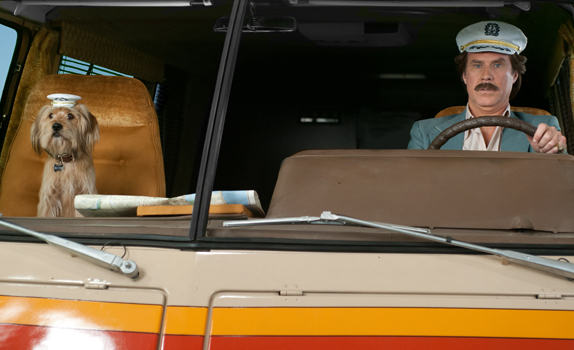
Did you have ideas for the film sitting around, or did writing kick off when you finally got the green light?
Yeah, when we got the green light we just sat down and started turning out ideas. I’m trying to think if there were any that were in our back pocket for a bunch of years. I don’t think so. The only thing we talked about was doing some musical numbers; that was the only thing we kicked around. But there was no specific joke that we were going after from the get go.
Did it take long to crack what the idea of the film was about, what the different storylines were?
There’s always one central idea that you base it all around and for us that was the rise of 24-hour news and cable. Once we had that idea we knew that there was enough meat on that bone that we could do a movie. Obviously, that was a big, seminal moment for the world, basically, so it was very convenient that it was only four or five years away from where the last movie was and it had such a manic impact. And then the more we researched it we found out that there were true stories of Ron Burgundy-type anchors being brought into 24-hour news.
In the first film there’s this kind of nostalgic parody of news whereas this one’s a bit of a slap in the face to contemporary news.
Yeah, well we always meant the first one to be a bit of a slap in the face to current news as well. Just how ridiculous the whole genre of news is, and the hair and the suits and the delivery and the style-over-substance. That was kind of the intent behind the first one as well. But I think you’re correct, I think with this one it gets a little more pointed. The target comes a little bit more into focus on this one. And you know, that’s just simply a function of the fact that if you’re gonna make fun of news… it’s gotten so crazy now that you really kinda have to go for it. So if we had soft-pedalled that, I don’t think the movie would have worked. And then really the idea that we loved was the idea that Ron Burgundy was the cause of all of it [laughs].
Absolutely. Look, if it’s going to be someone’s fault it all got dumbed down…
Exactly, we put it all on Ron Burgundy’s shoulders.
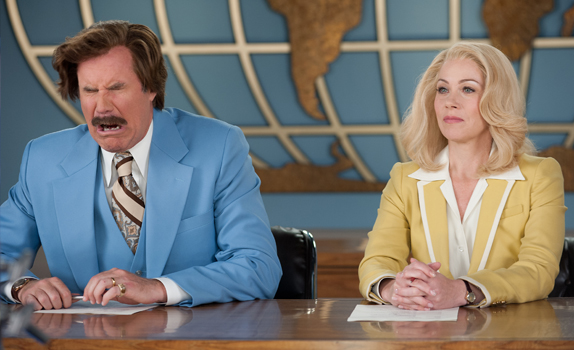
As an arm chair viewer, what is the kind of news story that gets you to stick around past a commercial break and watch the news?
Are you talking about my higher self or my lower self?
Let’s start with your ambition and contrast that with the reality.
Oh OK, alright. Ideally it would be a story about the Trans-Pacific trade partnership and finally details are being released and there are activists fighting against it and the White House is responding. Oh my God, that’s a huge story that’s going to affect industry for half the planet, I gotta see that story.
The reality is the story would be ‘Grandmother fends off wolverine with frying pan to save frightened children’. That would be the story I would actually stick around for.
Excellent. So a personal interest-slash-survival tale?
Personal interest-slash-survival tale? If there was TV show called that I would watch it every week.
Speaking of survival tales, Dobie the shark is a wonderful character in the film. When did he turn up? He’s got such a pronounced presence…
I think that for a lot of years a lovable great white shark has been missing from the film world and we finally brought it forward. Ron needed a kind of spiritual familiar to take him out of the depths of his pride and it seemed like a blank-eyed, personality-less great white shark was the one to do it.
They obviously feature very strongly in the news, sharks and great whites. There’s Shark Week of course. Here in New Zealand, the editor of our main newspaper just likes sharks so he puts pictures of sharks on the front page wherever possible.
Well that’s it too, there’s no bigger symbol of sensationalistic news than the shark so I think it subconsciously fits perfectly in that sense.
As a New Zealander, I loved the ruthless stereotyping of the Australian news boss so thanks for that. That was appreciated.
[Laughs] It’s not even really stereotyping is it, it’s just one guy, Rupert Murdoch, so yeah. We can all thank him for the long shadow that he cast.
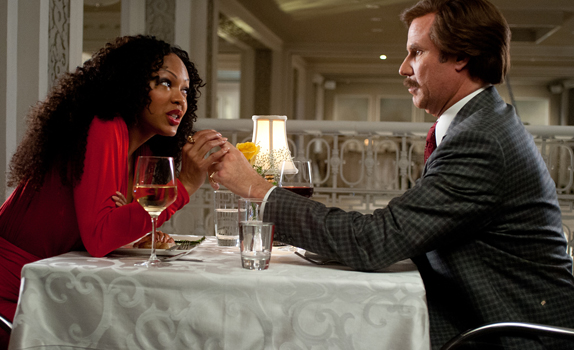
Absolutely! Now, this is a massive cast that you put together for this film. Without giving anything away, probably no more so than the big confrontation at the end. How did that scene come together and how did your wish list of cameos pan out?
Honestly it was one of those few times ever, maybe the only time ever, where our wish list was almost exactly what we ended up with. Usually when idiots like us call, people are busy and doing other things, but because of all the love that’s built up for the first movie, people actually returned our calls and were excited. Which was really, really cool. I couldn’t believe some of the people that actually flew in, showed up and shot with us. It was truly amazing and I think it had a lot to do with that sequence becoming so memorable.
While I’ve got you on the phone, I can’t let you go today without a quick mention of Eastbound & Down, which has just wrapped. Thank you for helping put together one of my favourite TV shows.
Boy, I feel the same way and in this case I’m a producer so I can actually brag about it. I couldn’t agree with you more, I thought it was one of the best TV shows of the last three or four years and that last season was maybe their best one. It was amazing how strong they finished. Danny McBride and Jody Hill, I gave huge congrats to them; I think they should be so proud. That show was insane and funny and dark and satirical and just… just a blast.
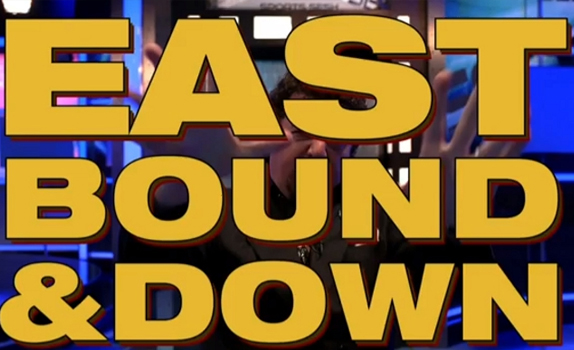
One of the things that impressed me so much in the last season was that they took something that had existed beforehand and gone in all these weird directions, and drastically, dramatically shaped it.
It’s true, and I feel like that season more than any season kept kind of a toe in reality throughout the whole thing. I actually kind of believed his relationship with his wife sometimes – before that you could never figure out why she was with him. And I felt like the whole thing was just composed in a more realistic way and then when it got crazy it made it even funnier. That last episode was just pure joy.
Their challenge was to wrap everything up and finish the show on a high note. What were the challenges for you in making the Anchorman sequel?
Our biggest challenge is that we wanted the story to continue. We didn’t want it to just be a rehash of the first one. We wanted to go into new places. We’d learned from watching other sequels that the ones that work are the ones that continue the story and the ones that struggle are the ones that just repeat the same beats. So the biggest thing for us was, let’s do new things with these characters – let’s go new places – and actually as crazy as the movie is, still have them somewhat evolve. So that was really where all of our efforts went. We called back a couple things from the first movie. It’s hard not to but we just tried not to do that too much.
I think that’s totally the right way to play it. Ron Burgundy, in a way the character kind of belongs to the public after that first film. In the time that’s elapsed since it came out, all those gags are shorthanded on social media every day. There’s references peppered into people’s conversations constantly.
Yeah, that’s the way it felt. It felt like we had a responsibility not to screw it up and to make sure that it kept the same spirit as the first one. That was our very responsible decision, was to not at all be responsible with the choices we made and to try and do ‘em crazy and make sure there’s a love song to a shark in there and make sure there’s proper idiocy sprinkled throughout.
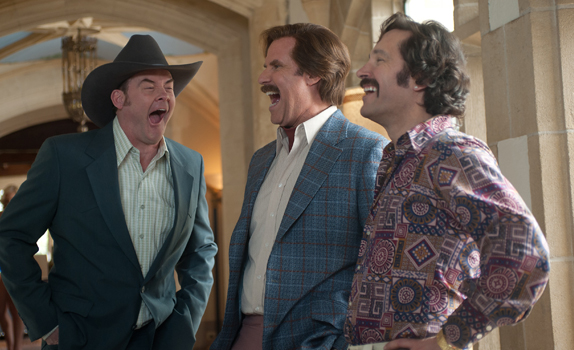
What do you think makes your working relationship with Will [Ferrell] so strong after all this time? As producers, director, performer, writers, what makes it tick?
It’s a question I get asked a lot, I’m never quite sure of the exact answer except for the fact that he’s just not an overly dramatic guy and I don’t think I am either. We don’t like to have arguments, we don’t like to have stand-offs. If he feels strongly about something, I trust him. He’s so funny, I completely trust him. If I feel strongly, he’ll trust me. It’s just one of those happy accidents where we both have really similar senses of humour. We’re the same age; we were kind of bought up the same way. Our dads are musicians. It really is effortless and always enjoyable. It’s a great, lucky thing to find someone like him to work with.
You’ve enjoyed a pretty golden run as a director. Your filmography is full of stuff I’ve loved to bits. Was being a comedy director something that factored into your ambitions early on?
Ambitions shift around, but it’s… In 6th grade I wanted to be a comic book artist and then as I got older I wanted to be a novelist and then I wanted to be a stand-up comic but then I was also interested in screenwriting and always watched movies obsessively. I just always watched and watched movies. It all kind of circled around and then it all started to come into focus when I was at Saturday Night Live. It was like, oh, this makes perfect sense. I can write and direct and was lucky enough to get a job where I get to do a little bit of everything I love.





